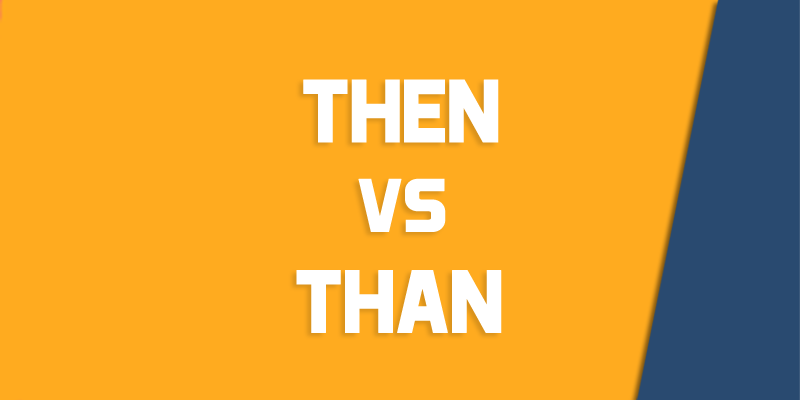Then vs. Than – What’s the Gist?
While it is not completely clear why these two words get confused, it happens fairly often.
- Then is primarily used as an adverb.
- Than functions as a conjunction or as a preposition.
Since the two words share most of the same letters, the confusion may just boil down to a typing mistake.

How to Use Then in a Sentence
Then definition: As an adverb, the definition of then includes: at that time; soon after that; or a necessary consequence.
For example:
- The plumber promised the homeowner that he would get back to them then. (Adverb)
- After the toddler’s nap was over, then he could have snack. (Adverb)
- The teacher made the assignment conditional: If the students turned in the project on time, then they could have donuts. (Adverb)
The word then also functions as a noun, meaning that time.
For example:
- Ever since then, the abandoned dog growled when food was taken away. (Noun)
Furthermore, the word then also acts an adjective, meaning existing or belonging to the time mentioned.
For example:
- The then-city auditor implemented the price hike for purchasing a dog license. (Adjective).
Another possible reason for the confusion between these two words could originate from the American dialect itself. Then and than are almost homophones, making them difficult to distinguish.
How to Use Than in a Sentence
Than definition: The word than has an entirely different function from the word then. Than acts as a conjunction, joining together words that indicate a comparison to something else; or to mean either rather than or other than; or in the sense of when.
For example:
- My brother is taller than I am. (Conjunction)
- It is preferable to get home delivery, rather than go to the store. (Conjunction)
Than also works as a preposition, meaning in comparison with.
For example:
- William Faulkner asked, “Why should a man be better than me because he’s richer than me?”
The word me that follows than in the above example is a pronoun in the objective case. Remember, use an objective case pronoun for an object of a preposition.
So how can you decide if you have a conjunction or a preposition, especially since they have similar meanings? The simple answer is to see what words follow than in your sentence.
- A conjunction will join words, phrases, and clauses together.
- A preposition will join noun and pronouns, but no clauses.
If the word than has a noun or pronoun following it, it is a preposition. A preposition will always have an object that follows it.
Ultimately, what you need to remember is if you have a noun or pronoun following the word than, it’s likely a preposition.
Outside Examples of Then vs. Than
- Their approach stands in stark contrast to the aftermath of 9/11. Then Gov. George Pataki and Mayor Rudy Giuliani, no strangers themselves to feuding despite both being Republicans, overcame their long-standing differences to cooperate. –New York Post
- But if you’re the kind of person who needs to have a full tech ecosystem and take advantage of EVERY feature, then you should probably only get a set of AirPods if you already have an iPhone (or, just pick up an iPhone). –Houston Chronicle
- The coronavirus mortality rate could actually be lower than initially suggested, according to a new study which also accounts for cases that have not been diagnosed. –Daily News
- Now more than ever, it is clear why our government needs accurate basic information about the people in our communities. –The Star-Ledger
Phrases That Use Then and Than
There are quite a few phrases that use the word then or than, including:
And then some: More is expected than originally anticipated or expected.
- After looking at the estimate to fix the car, the owner said, “This now and then some later, right?”
If you can’t take it, (then) don’t dish it out: If you are easily offended when people tease or criticize you in return, then you shouldn’t be eager to start it.
- After the girl complained to her mom about her brother’s response, the mom replied, “Well, if you can’t take it, then don’t dish it out.”
No later than: A particular date that something cannot go beyond.
- The credit card bill was due no later than the eighth of the month.
Don’t bite off more than you can chew: An admonition to not take on any more than you can manage effectively.
- The little boy had a goal of reading three books a week, but his dad cautioned, “Don’t bite off more than you can chew.”
How to Remember These Words
A mnemonic device focuses on the particular letters in each of these words, and it may give you the direction you need to pick the right one.
The word then is an adverb, and they both share the letter e.
The word than is a conjunction, and the most common conjunction is the word and. Than and and share the letters an.
If you think of the function in the sentence and the letters that correspond with this problem pair, it may help you recall the correct word.
Article Summary
Is then or than correct? If you want an adverb, then choose then. If you want a conjunction to join something together, pick than.
- Then functions as an adverb, noun, and adjective.
- Than is primarily a conjunction but can function as a preposition.
